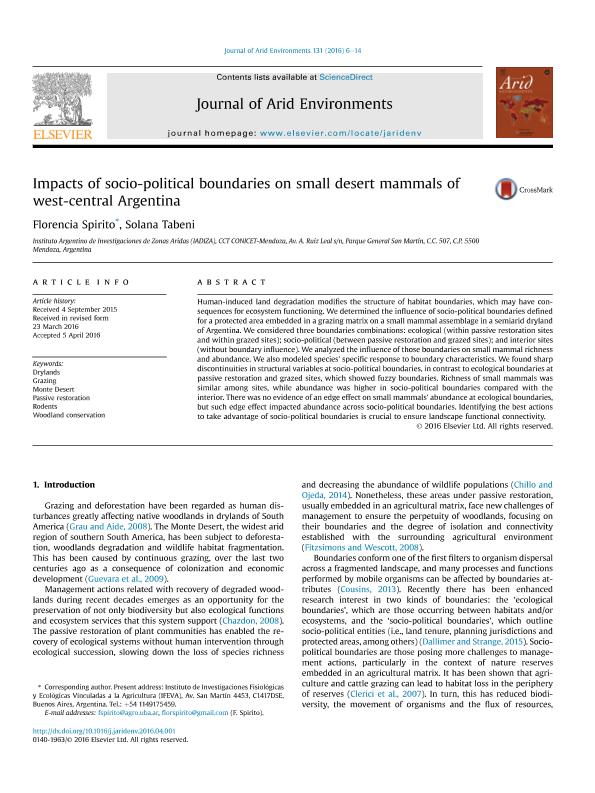Artículo
Impacts of socio-political boundaries on small desert mammals of west-central Argentina
Fecha de publicación:
05/2016
Editorial:
Academic Press Ltd - Elsevier Science Ltd
Revista:
Journal of Arid Environments
ISSN:
0140-1963
Idioma:
Inglés
Tipo de recurso:
Artículo publicado
Clasificación temática:
Resumen
Human-induced land degradation modifies the structure of habitat boundaries, which may have consequences for ecosystem functioning. We determined the influence of socio-political boundaries defined for a protected area embedded in a grazing matrix on a small mammal assemblage in a semiarid dryland of Argentina. We considered three boundaries combinations: ecological (within passive restoration sites and within grazed sites); socio-political (between passive restoration and grazed sites); and interior sites (without boundary influence). We analyzed the influence of those boundaries on small mammal richness and abundance. We also modeled species' specific response to boundary characteristics. We found sharp discontinuities in structural variables at socio-political boundaries, in contrast to ecological boundaries at passive restoration and grazed sites, which showed fuzzy boundaries. Richness of small mammals was similar among sites, while abundance was higher in socio-political boundaries compared with the interior. There was no evidence of an edge effect on small mammals' abundance at ecological boundaries, but such edge effect impacted abundance across socio-political boundaries. Identifying the best actions to take advantage of socio-political boundaries is crucial to ensure landscape functional connectivity.
Palabras clave:
Drylands
,
Grazing
,
Monte Desert
,
Passive Restoration
,
Rodents
,
Woodland Conservation
Archivos asociados
Licencia
Identificadores
Colecciones
Articulos(IADIZA)
Articulos de INST. ARG DE INVEST. DE LAS ZONAS ARIDAS
Articulos de INST. ARG DE INVEST. DE LAS ZONAS ARIDAS
Articulos(IFEVA)
Articulos de INST.D/INV.FISIOLOGICAS Y ECO.VINCULADAS A L/AGRIC
Articulos de INST.D/INV.FISIOLOGICAS Y ECO.VINCULADAS A L/AGRIC
Citación
Spirito, María Florencia; Tabeni, Maria Solana; Impacts of socio-political boundaries on small desert mammals of west-central Argentina; Academic Press Ltd - Elsevier Science Ltd; Journal of Arid Environments; 131; 5-2016; 6-14
Compartir
Altmétricas




